Jan Carson's Blog, page 13
July 14, 2016
Postcard Stories Europe 2016: Week One
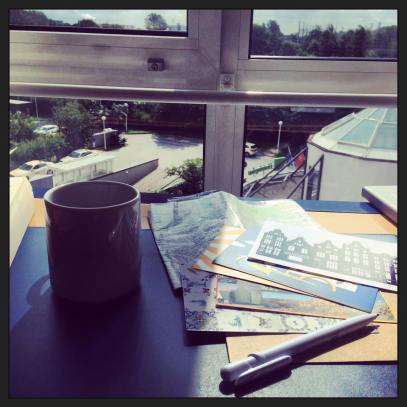
July 8th – Belfast International Airport
Lizzie Maguire
I had the window seat and you the middle and a smaller girl –your sister I presume, or perhaps a cousin- took the aisle. Somewhere over Lough Neagh you leaned across me to take three photographs through the airplane window. Flash. Flash. Flash. Like small bursts and blooms of headache migraining down the side of my face. You didn’t ask permission. You didn’t apologise. In my head I called you ill-mannered, badly brought up, selfish, and wondered where your mother was. All through the flight I ignored you. I kept my elbows to myself on the handrest. I didn’t look at you and, when somewhere over the Isle of Man, your shoulders started heaving, I presumed you laughing into whatever you were watching on your Iphone. YouTube. Netflix. Iplayer. It was only when we landed in Schiphol and you stood to open the luggage locker that I saw you’d been crying. Hard. For over an hour. Then I felt guilty but could not place the guilt precisely or let it go.
July 9th – Amsterdam
Mary Hegarty
While we were in the museum it rained. Not heavily but hard enough to shift the stale water smell from the canal banks. The city smelt of greenhouse and bathwater and indefinable cleanliness. Which made us hungry. We had a very specific hunger for ice cream in waffle cones. The streets were to damp to sit or stop so we walked through the courtyard, past the American bookshop and the place where, only hours before, the little Dutch children had been chalking the pavements outside their doors.
“Look,” you said, and we all looked at their chalk people and animals fading now from the rain and sliding towards the canal’s edge as if anxious to erase themselves entirely.
July 10th – Amsterdam
Clinton Kirkpatrick
There are hundreds of people streaming in and out of the Vondelpark gates. Sleek-skinned Jans and Jaspars in lycra shorts and running shoes, first names pinned to their damp, shirt front with safety pins. Their feet make the sound of paper falling as they pass. It is hot. Too hot for half marathons or even the watching of half marathons. Too hot for anything but indoors and we are anxious for old paintings and the cool, dark hallways which house them. We walk past the Vondelpark to the Rijksmuseum but the runners are two lanes deep all the way round the Museumplein. They are both coming and going, running so fast they are little more than royal blue streaks against the eye blue sky. There is no obvious place to cross them. No bridge or subway. So we duck the barrier and slip into the stream, becoming, for one brief moment, runners. We weave and dodge and sidestep the shoal until we reach the opposite side of the road and the art and the shade, which is perfectly cut for our ease, and we do not envy those runners. Not a single bit.

July 11th – Hamburg
Joan Weber
There is no such thing as a straight street in Hamburg. Even the bicycle lanes worm across the pavement like pale pink ribbons. The buildings bend. The river sallies and it is impossible to know whether a road will actually arrive you at a new place or simply double back on itself like someone hard to follow joke.
We become lost looking for the Botanischer Garten. There will be music there tonight and an opportunity to drink beer outdoors, without fear of Police or fine. This is Germany to us. But the street names are so long, one Strase blurs into the next on our tiny, hotel map. And, no one stops to offer assistance, and all the signs are in German.
By the time we arrive at the park all the musicians are gone and the audience is little more than a handful of drunk and amorous couples dotted across the green. The trees are still strung with fairy lights though. All their tiny, twitching lights like old men winking at us, saying, “you missed something real special here tonight, Girls!”
July 12th – Hamburg
Matthew Rice
Last night, whilst Hamburg slept, a new building burst from the muddy harbor water and stretched sixteen storeys up to scratch the sky. Miles below, the shipyard cranes tipped their heads in wonder and tourists taking chartered cruises round the canals, lifted their cameras to their eyes and snapped and snapped and snapped again.
This new building was shiny, as if still wet-glassed from the ocean, and covered with hundreds of dips and circular protrusions like Christmas baubles or fortunetellers’ globes. Those ships and industrial barges curious enough to nudge the edges of this new building soon discovered the walls were not solid but rather formed from over-sized sheets of bubble wrap- the sort of material usually kept for wrapping fragile parcels.
These plastic postules would burst up impact with a ship’s helm making a satisfying putt putt sound which gave the local sailors great and simple joy, which kept the little boats coming back night after night to play the building like a percussion section, which became something of a visitors’ attraction, which made the tourists clap their hands with glee and laugh loudly, which was not considered normal in a German city of Hamburg’s size and standing.
July 13th – Hamburg to Copenhagen
Sinead Gleeson
The first lady is sitting in the second lady’s seat. The second lady is becoming insistent. It is five hours from Hamburg to Copenhagen and she doesn’t want to stand. She is not wearing shoes for standing. She wants to sit down to eat her tiny German sandwiches in peace.
The first lady is equally insistent. She has claimed the seat first. Squatter’s rights. Besides, she is older and more likely to die if forced to stand up for five hours straight. The tickets are compared. Both have the same seat allocation. What a mystery!
The conductor is called. The conductor is baffled. Then, the conductor notices the date on the second lady’s ticket. September. Two months from today. Everyone laughs. Even the Danish people eavesdropping in the opposite seat. There is plenty of room in First Class for the second lady. No one will be thrown off this train today.
You are not laughing. You are remembering the time you turned up on the wrong month for flights from Edinburgh, (and Bristol, and Amsterdam), and all the money you spent getting home and the items you might otherwise have spent this money on. Books, for example.
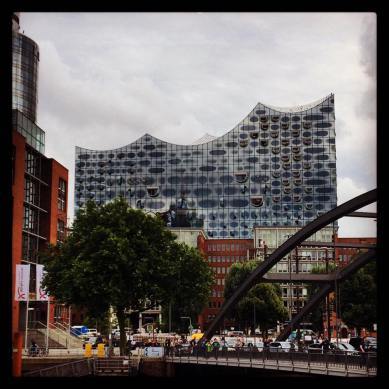


June 25, 2016
For My Weary Friends
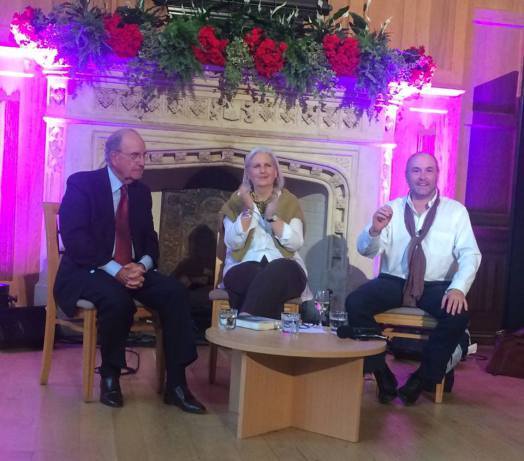
About two months ago I found myself jammed between two elderly people on a plane somewhere over the Atlantic Ocean. It was twelve midnight, or it was five in the morning depending on whether I was taking my bearings from my leaving point or my destination. I was inclined to favour my leaving point. I’d been in the States for almost three weeks: reading and writing, listening to people read and having the most wonderful conversations with people who had wise and interesting things to say. It had been easy. If I’m entirely honest life is occasionally exciting and often challenging and definitely rich with community here in Belfast. But it is rarely easy.
Many of you who work in the arts and culture sector here will know exactly what I’m talking about. There’s never enough money to do things as well as you’d like to see them done. You’re always short of time and tired and frustrated by the box-ticking exercise which is trying to get money out of the arts funding bodies. You compromise your own artistic practice to run community arts projects because you believe they’re important and also -let’s be honest- because they pay the electricity bills. You feel guilty every time a fixed term community arts project comes to an end because you’ve invested in the participants and you don’t want to leave them high and dry and disappointed because a good thing has come to such an abrupt halt. You often feel defeated before you’ve even begun and, at the back of your head, is the niggling suspicion that things wouldn’t be half as hard if you relocated to London or New York or even Milton Keynes. You are good people but you’re weary.
In the airplane over the Atlantic I was listening to Van Morrison on my headphones. It’s a little tradition I have every time I come back from the States and have to re-adjust to my ordinary life in East Belfast. That evening/morning I was listening to “Cypress Avenue” in the quiet dark, (the cabin lights had been dimmed for sleeping and both elderly people had duly fallen asleep, the one to my left, twitching a little against my shoulder). I’d never really listened to the lyrics before but the words, “I may go crazy before that mansion on the hill,” sucker punched me right in the soul, and there I was crying, as quietly as possible, in the pitch dark belly of steerage.
Many of you know this feeling. You’re not cynical or jaded enough to have forgotten what it is to want to help, to want to be part of dragging this country kicking and screaming into the twenty first century. You want to foster community and make powerful art, art which isn’t just good for Belfast but really, bloody, terrifyingly good regardless of where it was conceived. You want to be able to say with absolute confidence, “I am proud of the place I come from,” and to never have another Northern Irish child told, “if you want to make it in business/art/sport/anything really, you’ll have to move to the Mainland.” You want to serve this place and still flourish as an artist and also a human being. You also know how far away these goals seem right now. You know what it is too feel like you’ll go crazy before you get anywhere even close to the destination.
Today, you feel even more bruised, even wobblier and wearier than normal. Today you feel like not getting out of bed or letting your anger explode all over social media. Today you feel like packing everything you own into a van and getting as far away from this mess as possible. You want to go somewhere easier. There are so many places that would be easier than here.
Here’s the thing you need to hear this morning. You are brave for staying. You are brave for investing in this place. Goodness knows it doesn’t make it easy for you. You could be making more money elsewhere. You could be climbing the career ladder. You could have much more time to focus on your art and your family and your mindfulness and well-being, not to mention your vegetable plot. Everything could be so much easier. But, I know you all well enough to remind you that you never signed up for easy. You signed up for change and moving things forward and scraping tiny slivers of hope from the bottom of the bucket. And, just in case you forgot, you also signed up to be part of the most amazing community of creatives on the planet: people who will cry with you today and laugh with you tomorrow and give you wine and food, (in that order), encouragement when your work in progress isn’t progressing very fast and critique when you’re genius gets out of control, space and time and inspiration. Wonderful, wonderful people. You are blessed despite your circumstances.
So, this morning I am going to get up and write because that’s the only thing I know how to do. I suggest you do likewise, in whatever medium your hand turns most naturally to. I suggest that you learn to write when you are tired and when you are hungry and when you haven’t been paid a penny for what you write. I suggest you write even though the fear and anxiety is an actual, physical lump in your throat. I suggest you write angry if angry is the only thing you can manage right now. I suggest you keep writing when nobody is buying your books and there are only four people in plastic chairs at your readings. I suggest you write through the critics’ attacks and the skeptics’ derision and you keep your ear open to those wise voices who have only your best words in mind. I suggest you stop giving a damn about all the boxes which require ticking and write what you can write, write what you need to write. This is all that’s asked of you. I suggest you stop writing lazily, sloppily or without the desire to grow as a writer. I suggest you let ambition swell in your belly and begin taking steps towards becoming the best writer you can possibly be. I suggest you scare yourself with your writing. I suggest you write with an urgency you’ve never experienced before because now is the time for urgency.
Last night I listened to Senator George Mitchell talk. He said an awful lot of things about peace and progress in this place which, in light of yesterday’s events, were already tottering on the edge of irrelevance but the sentiment I chose to take home and consider was his reminder that every act of oppression, evil and intolerance tells its own dark, and oftentimes persuasive story. If we are to have any hope of affecting change our stories must be so much more compelling than those dark stories we’re currently surrounded by. Our stories must be loud and urgent and very, very good. We must be writing.


June 21, 2016
Belfast Book Festival 2016

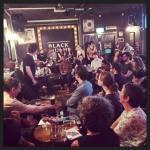

This was meant to be a fabulously, eloquent blog about how wonderful Belfast Book Festival 2016 was and why we continue to need book festivals to improve the literary landscape in Northern Ireland, but I’m so knackered from having spent every spare moment of the last ten days at Belfast Book Festival 2016 that I have decided to eat chocolate and catch up on Holby instead of writing it.
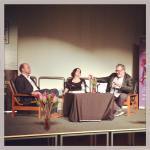

So, I’ll just say that Keith Acheson is a saint and a legend for organising such a tremendous wee festival and continuing to smile throughout, (even on day eight and nine when he did look a little grey around the gills), and the team at the Crescent Arts Centre have once again proven themselves to be all round troopers and so much more than just staff and volunteers. Thanks for putting up with my chat and minding my ever-increasing baggage and keeping the cheeseboard topped up in the Green Room and seemingly never leaving the building, not even to sleep. The good folks at the Crescent do an incredible job of noticing and welcoming everyone who comes through their door, (not just during Book Festival but all year round). They understand that a venue is not working properly if the people who look after it don’t treat it as if it is an extension of their own home and welcome visitors accordingly. They make me miss the Ulster Hall and all our beautiful regular event attendees.
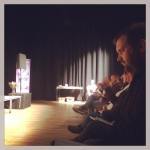
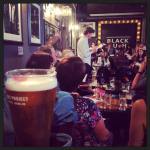

Which leads me to the happy conclusion that Belfast Book Festival continues to be concerned with people just as much it is with great books. You can’t have a festival, no matter how great the programme is, without people and there were a heck of a lot of them knocking about the Crescent these last two week. This year I made new friends. I became friends in the real world with a couple of wonderful individuals I’ve only ever known online and, most importantly, I got to spend precious, wonderful, hard-talking, much-laughing time with some of the friends I love most in the world. As a writer these are the kind of environments were you find encouragement and inspiration and even opportunity. They’re so much more than just showcasing your latest book. They’re all about finding the creative enthusiasm to write the next one. I know from talking to our visiting writers that they were blown away by the warmth of welcome they received in Belfast. This makes me really proud and also glad to hear people are going home with Belfast memories which are not entirely Game of Thrones-based. Thank you BBF team for creating a space where community flourishes and people are valued. You made me feel all warm and part of something special, which is no mean feat these days. It’s no surprise that Belfast Book Festival attendance is rising ever year. If you treat your audience and writers this well, they’re always going to come back for more.
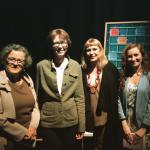

Finally I wanted to say a big thank you for introducing me to some fabulous writers I’d never heard of before the festival. Mary Morrissy- what a revelation. Kate Tempest- pushed me well outside my comfort zone in a good way. Many, many poets from Yorkshire-glad to discover it’s not just Simon Armitage dominating the Dales. While my wallet is a lot thinner than it was last week, (no thanks to David and the No Alibis crew), my bookshelves are groaning happily beneath the weight of some pretty great looking new books. I predict a few anti-social reading evenings to come. All this to say, Belfast Book Festival 2016 I had a blast. I am tired but in the best kind of way. Next year let’s be having more of the same plus George Saunders and a slightly more relaxed policy on smuggling your own carry out into the Cube.


June 19, 2016
What We’re Really Talking About
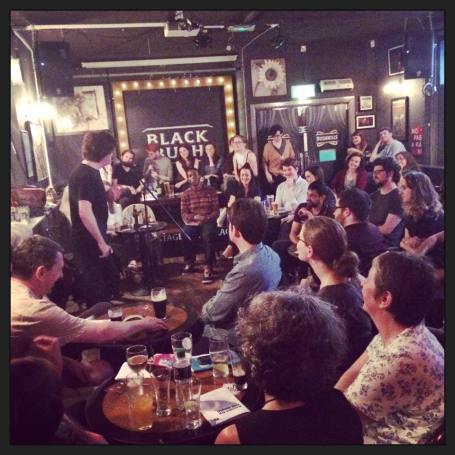
Tonight I am having chicken super noodles and a Muller fruit corner for dinner. In my pyjamas. In bed. In approximately twenty minutes I will be asleep. It is only just gone eight. I have never been so tired in my whole life. There’s a reason for this. I think I’ve been to around two dozen literary events in the last ten days. This is not normal. Even for me. For the time being I have nothing left to say about short stories or being a woman who writes short stories or being from Ireland and also writing short stories. Or Flannery O’Connor. There have been a number of book festivals, (most notably Belfast Book Festival which I will write about properly when I remember how words work again), and a variety of other literary events featuring either wine and buns or tea and buns. I have enjoyed almost all of them immensely -particularly the one where I nearly had to do hip hop live on stage- but I’m quite glad to have a whole four day’s reprieve from talking about books and how to write them, (as if any of us actually know what we’re doing when we sit down to begin a story).
When someone places a mic in front of you at a Book Festival you’re generally meant to talk eloquently and with some modicum of wisdom about writing. Most writers eventually become reasonably good at this, though some never quite seem to get the hang of it. It has always struck me as a dreadful shame that time spent listening to such writers waffle on or read terrible poems about cats or war can’t be redeemed at a later point in life in a system similar to what I believe to be called “injury time” in football. If I was God I would invent this soon. I’ve lost quite a few hours already.
Before taking part in Book Festivals I attended many Book Festivals as an audience member, or “punter”, as we like to call them. I was under the impression that the eloquent and reasonably well-informed conversations taking place on stage were simply extensions of other eloquent and reasonably well-informed literary-based conversations taking place back of house and in the bar, post-show. Now, I know better. For every, ‘how do we read Kafka against the backdrop of Brexit? type conversation I’ve partaken of in the last ten days, there have been at least six slightly more mundane, ‘do you like cheese?’ type conversations. I have to say it has made my heart happy, and a little relieved, to realise most writers are really just very ordinary people, who happen to wear blazers and write things which make it to publication. This realisation has taken the fear right out of Book Festivals which is fortunate seeing as it looks like they’ll be my main social outlet for the rest of the summer.
Here, for the purpose of reassuring everyone that the average Book Festival attending writer is no different from the average Book Festival attending audience member, is a list of topics I have discussed with fellow writers in the last ten days.
The merits of playing the two p machines in Barry’s Amusements Arcade, Portrush over the merits of playing the two p machines in the Amusement Arcade beside the chip shop which is definitely not as classy but has better prizes.
Some combination of the following topics: I am broke. Are you broke? Where is the money? Ah, so there’s no money anywhere then. That’s a pity because I am broke. Repeated ad nauseum.
Game of Thrones.
The correct consistency of egg white in a fried egg.
Where is the wine? Did you hear there was wine? I think there’s wine somewhere. No, that was just a rumour. There’s no wine. Just cheese and onion crisps and fizzy water left in the green room now.
Should writers get people in to clean their houses? Could house-cleaning money be better spent, eg. on subscriptions to The New Yorker or more wine? Is the whole having a house cleaner v. not having a house cleaner question a moral debate? Might it actually be better to just sell your house once it has reached an irredeemable level of uncleanliness rather than risk looking like you have money to throw away on luxury items such as cleaners?
“A Little Life” Have you read it? Why have you not read it? Did it give you carpel tunnel syndrome? (If you only read it in bed and place a pillow beneath your wrist you will be less likely to incur CTS). How many times did you cry during the last chapter, especially the bit where everyone is kind to Jude and he cannot accept their kindness?
Does anyone have a biro/tiny Post-It note/glass of wine/Waterford crystal bell/copy of my book? (Usually uttered with some level of mild panic mere seconds before going on stage).
Last brownie-esque one upmanship over who has given the worst reading of all time, (I once read to four people. I once read to four empty chairs. I once read to four empty chairs and then someone came in and sat on one of the chairs and died. I once read to the sound technician and he was playing Tetris on his phone the whole way through the reading).
Flannery O’Connor. In all seriousness if you run out of things to say at a Book Festival you can just say the words Flannery O’Connor over and over with hushed reverence and most everyone who’s there will assume you know what you’re talking about. Flannery O’Connor is the Book Festival equivalent of Jesus being the answer to every question in Sunday School. She’s probably the answer to a fair few Sunday School questions too.


June 11, 2016
Five Things I Learnt From Kate Tempest
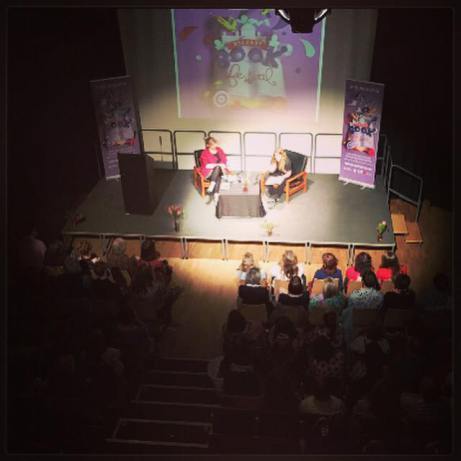
On Thursday night I had the opportunity to spend some time getting to know poet/rapper/playwright/novelist Kate Tempest before interviewing her at the Belfast Book Festival. I have to confess that as a person who listens almost exclusively to Radio 4 and Bob Dylan, doesn’t really read newspapers and only turns the television on twice a week for Holby and Casualty, I’m a little out of touch with the cultural zeitgeist. I’d never heard of Kate Tempest before I was asked to interview her and when I did start reading, watching and listening to her work, my immediate response was, “what on earth was Keith thinking when he asked me to interview this girl. At 36 I am much to elderly to appreciate this kind of thing.” I have to admit I wasn’t looking forward to Thursday night. I thought Kate and I would have nothing in common and I’d be sat there awkwardly feeling ancient and trying to work out the correct verb to apply to hip hop, (doing, performing, practising, hip hopping?)
I wanted to write this blog today because sometime it’s important to say you’re wrong about people and perceptions and even entire art forms. I didn’t feel ancient or awkward or outside the moment on Thursday evening. As Kate talked and “performed”and engaged with the audience I 100% understood why people want to be, not only in her presence but also in the presence of her words and why we need to give her a place at the mic alongside the more traditional novelists, poets and playwrights. Mostly, however, I learnt the importance of not pre-judging an experience, of leaving your perceptions at the door and being open to whatever the evening wants to teach you. I learnt about my own capacity for snobbery and that sometimes, it’s really refreshing to be wrong.
I could say a lot more about Kate Tempest’s writing but I’d rather talk about her humanity. I’m a lucky girl and have had the opportunity to sit down and chat with some really special people over the last three decades. You know when you’ve had one of these encounters, not because the person is necessarily important or particularly famous, but because you leave the room a little bit changed by the experience. It’s been a difficult enough few weeks and I am thankful for Thursday night’s encounter and the way it’s stayed with me all through the rest of the week. I feel a little less inclined to sit down in the street and wallow and a little more bent towards picking myself up and getting on with the business of writing stories. I think I have Ms Tempest in part to thank for this. Here are a few things I learnt from hanging out with her.
Passion isn’t something you should apologise for- it was so refreshing to listen to someone who is enthusiastic about what they believe in and willing to put strong words behind their enthusiasm. Sometimes you get so weary fighting for things you believe in you let your words become muted. More strong words spoken without apology are needed in Belfast these days.
It’s ok to fail – the most refreshing thing Kate said all night was that she’s still learning as a writer. She also mentioned that Don Dellilo took almost ten books before he hit the sweet spot and achieved recognition with “White Noise” These days the whole arts industry is so weighted towards income generation that there’s very little room for artists to fail and grow with each new project. Failing is a vital part of the journey towards developing as an artist and it’s both freeing and refreshing to hear an established artist say that they are willing to fail and learn through the process of developing their artistic practice.
Be present- I interview a lot of writers and I don’t think I’ve ever met anyone so very in the moment. It’s wonderful to watch an artist who is able to put the audience at ease -even while they’re under the spotlight- and then allow the evening and its conversation to go wherever it needs to go. I got a real sense from being around Kate that she understands she’s there to serve not to be served and this means introducing your writing to the audience in a way which allows it to take precedence over your role as a writer. You’re not there to stamp your personal brand on an audience. You’re there to make space for your words to do what they need to do. That’s actually quite a liberating thought.
Be kind – I’ve not got a lot to say about this one, except humility is absolutely essential and I’m always made aware of this when I writers who are quicker to listen than they are to speak. It’s wonderful to watch an established artist take time to really listen to what audience members and fans want to say. It shows respect. It shows humility. It shows a well-developed awareness that stories begin and end with people and if you can’t listen, you’ll never be able to write stories with any kind of honesty or empathy.
Don’t be cynical – There is an earnestness to Kate Tempest which is almost overwhelming. She’s not trying to play tricks with her words. She’s not trying to be clever or witty, (though she is extremely witty). She’s just saying it like it is. The Kate I met in the Green Room was exactly the same Kate who got up on stage and talked to and with 150 people. I think this was probably the main thing I came away with on Thursday. It’s not only ok, it’s absolutely essential that we continue to wrestle with cynicism in our work. I’m not talking about developing stories and poems which are saccharine or reluctant to tell life as it is. I mean, we need to constantly wrestle against the weariness that says, ‘there’s no point in writing this,’ and ‘nothing’s ever going to change.’ At this stage in my artistic life I’d rather be labelled as over-earnest or over-passionate than cynical. I think we could all do with a shot of Kate Tempest’s enthusiasm.


May 15, 2016
Casualty Bingo

Last night there was no Casualty, on account of a silly song competition. Instead of weeping I used my time profitably to develop the following Casualty-themed bingo game. Next time you are bored of a Saturday evening, (and I’m pretty sure the concept will translate equally well for Tuesday night viewings of Holby City), you and your fellow viewers can select ten of your favourite BBC medical drama-themed cliches and see whose ten appear first in the episode your watching. You’re very welcome.
Doctor saying U’s and E’s in an authoritative voice.
A new character appearing as a witness to an accident at the start of an episode then, fifty minutes later, finding themselves employed as a nurse/doctor/receptionist/paramedic.
Patient attempting to discharge him or herself against the better judgment of the medical staff.
Patient who discharges him or herself against the better judgment of the medical staff collapsing in the car park less than five minutes later.
New F1 proven to be completely inept within ten minutes of hitting the ward.
Maverick young doctor conducting a dangerous procedure without the knowledge of his or her superior.
Superior of maverick young doctor who conducts dangerous procedure without permission, initially becoming irate, then quickly admitting that the maverick young doctor was right all along.
Patient developing a tension pneumo-thorax/blood clot/seizure about 35 minutes into an episode because the condition was originally missed by the medical staff who forgot to do a blood pressure check/ultrasound/x-ray.
Doctor/nurse/receptionist/paramedic who are quite happily employed at the beginning of an episode and yet, by the episode’s end, have acquired a new job/life goal, left Holby and enjoyed a fabulous leaving party in the pub across the car park.
Patient who is reasonably pregnant but hasn’t seemed to notice until she arrives in the emergency room with a nosebleed/sprained ankle/nasty dose of concussion.
Surgeon with a hand tremor which he/she attempts to hide for as long as possible.
Emergency tracheotomy performed with a biro
Episode opening with a potentially lethal scenario, (speeding cars, amateur firework display, knife juggling), only to find the injuries focused upon are of a completely unrelated nature, (paper cut, heart attack, lethal brain tumour).
Appearance of Northern Irish character who turns out to be a wife-beater/alcoholic/terrorist.
Charlie Fairhead raising both hands to the heavens in a gesture which can be interpreted as anger, frustration, bafflement and overwhelming happiness, (sometimes simultaneously).
Doctor being vomited upon, usually whilst wearing a particularly smart outfit because they have an important interview later in the episode.
Episode which begins with a scene of unspecified horror and then flashes back to ten hours earlier, explaining the day’s happenings backwards. (Often accompanied by “arty” camera work).
Paramedics liberating the ambulance for their own mercy mission.
Pets on the ward. (Subsection pets being operated on as if they are actually patients).
Patient attempting to jump or fall from the roof.
Nursing staff misplacing a child on the ward. Child then being placated with a chocolate bar from the vending machine
Patient passing out in the toilets thus necessitating the kicking in of a door.
Staff member with a drink/drug habit. Best indicated by the slamming of locker doors, angrily at inopportune moments.
Family with marital problems at the start of an episode, experiencing complete reconciliation by the end of the episode.
Patient with-holding some key aspect of their illness, (e.g. heroin addiction, pregnancy or shellfish allergy).
Staff or patients being held hostage by a psychopath, usually in the basement.
Seemingly sackable offences (e.g. killing patients with the wrong medication, having affairs with patients or attempting to forcibly trephine a patient with a household drill), forgotten about after two to three episodes.
Patient shocked back into the land of the living after all but one, (atypically maverick young doctor), refuses to give up on him or her.
Open fracture. Most commonly leg based, more interestingly arm.
Actor previously seen on Hollyoaks introduced as new staff member.
Bonus point for:
Holby City cast member appearing in Casualty or vice versa.
Double Bonus Points for:
Holby at Casualty or Casualty at Holby episodes complete with mash up of both theme tunes. (Code name: “The Evolutionary Pinnacle of the BBC”)


May 7, 2016
Talented Friends: Hannah McPhillimy
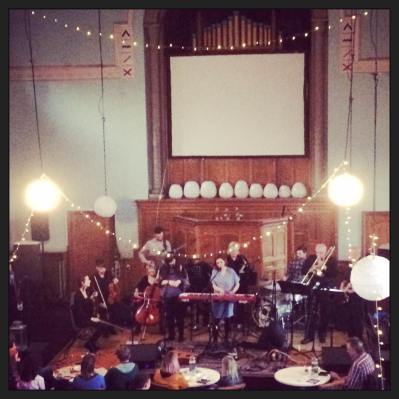
It’s been an awfully good week for art in Belfast. If you happened to find yourself in the city centre of an evening over the last few days, chances are you’ve come across one or more of your friends dashing about like headless chickens trying to cram two or even three brilliant events into one night. We have the Cathedral Quarter Festival to thank for this. We’ve been spoilt for choice this week. At one point I seriously considered time travel or trying to split myself in two. However, on Friday evening there was only ever one place I was going to be.
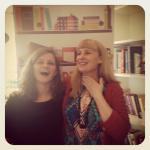
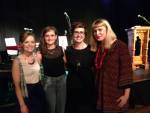
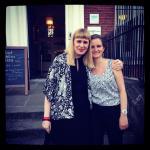
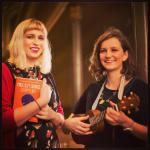
I first met Hannah McPhillimy about four years ago. I can’t even remember the circumstances which threw us into each other’s orbit. It’s Belfast we live in, a city so small, it’s inevitable that everyone who should find each other, eventually will. I met Hannah and I almost instantly knew she was going to be an important person in my life. During the last four years there have been innumerable long coffees, adventures with a very heavy keyboard, collaborations, late night chips and a friendship I’ve come to lean upon for so much more than artistic encouragement. Hannah McPhillimy is one of those people who reassure you that the world is basically a decent place. Two years ago we worked together to produce a show and an Ep of music, based on my first novel, Malcolm Orange Disappears. This year, I had the pleasure of writing a short story in response to one of Hannah’s songs, “Ruins.” I feel there may well be much more artistic comings and goings in our future. I’m hoping she takes up the tin whistle, or some instrument slightly lighter than the deadweight keyboard.
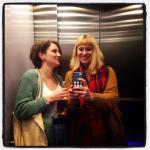
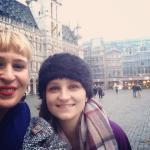
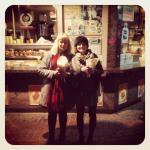

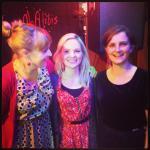
Last night Hannah released her new Ep, Wind Machine as part of the Cathedral Quarter Arts Festival. Redeemer was packed to the rafters and rightly so. In the four years since I first met her, Hannah has grown into herself musically and is now one of the most accomplished musicians and songwriters in Belfast. Her voice has a life of its own, ducking and diving over the beautiful tunes she’s written. It’s a credit to her songwriting ability that I woke up this morning humming songs I heard for the first time last night. Playing with a band of accomplished musicians and singers Hannah’s songs were as lush, as epic and heartbreaking as I’ve ever heard them. There’s an unaffected joy about what Hannah does. She is the same person off the mic as she is performing. It’s very easy to watch a person this comfortable on stage. It’s refreshing to listen to someone singing songs she actually believes in. I’m a little bit biased but if you haven’t been to see Hannah McPhillimy yet you really need to make it a priority. I have a suspicion that she’s not going to be playing to little audiences for very much longer.
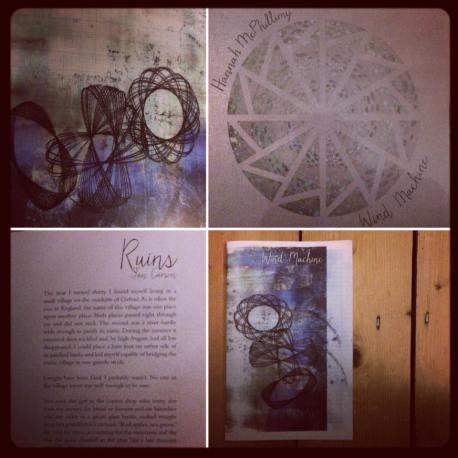
Hannah’s Ep. Wind Machine is available to download now at https://hannahmcphillimy.bandcamp.com/album/wind-machine do it. Your ears won’t regret it.


April 27, 2016
Last Ever Literary Lunchtime

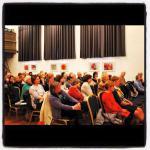

I’m a little bit sad this evening. It feels like I’ve been saying, “it’s the end of an era,” far too many times of late. There have been a lot of ‘lasts’ as I transition out of my role at the Ulster Hall and into something new. Change isn’t always the easiest thing to process. I’ve stopped counting how many times I’ve recently said, “gah, I’ll need a big glass of wine if I get through this day in one piece.” Today we had our last ever Literary Lunchtime. I got to read a short story alongside the wonderful Irish writer, Danielle McLaughlin and while it was such a treat to share a stage with her and get to hear a little more about her writing process, I’d be lying if I didn’t say it was something of a bittersweet experience.
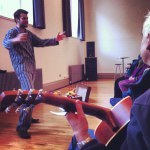
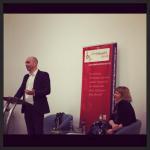
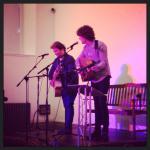
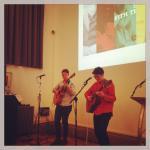
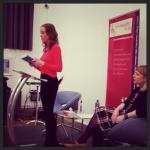
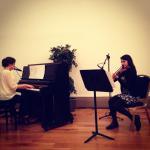

I love Literary Lunchtimes. There’s a big part of me tied up in every one of them. I’ve been developing these readings over the last five years. When I first began literary programming I sat in the foyer of the Ulster Hall with Damian Smyth and talked about creating a forum where young writers could showcase their work, where audience members would be made to feel welcome and some of the stuffiness of literary events could be exchanged for warmth, humour, hospitality and all that good stuff. I think we achieved that and a little more besides. I think we made community. Part of me wants to be very bitter tonight, to ask why great projects have to end so abruptly and question the wisdom in other, more powerful people’s decisions. However, I’m not going to. I think it’s much more important to use this plateau point as an opportunity to stop and celebrate what we’ve managed to achieve through the Literary Lunchtimes over the last five years.
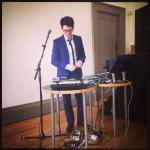

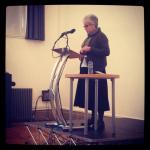


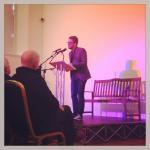
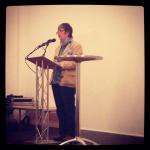
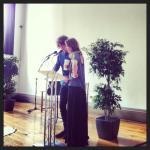
So heres, to being incredibly grateful for every one of the two hundred or so writers who’ve now read their work in the Group Space -some devastating us with their wordery, others making us want to claw our own ears off in frustration. Here’s to that one audience member in every event who raises their hand and asks a question which isn’t really a question at all. Here’s to the John Hewitt Society, loyal partners in custard cream distribution and wrestling wobbly pop-ups and allowing me to interview some of my all time favourite writers. Here’s to dear only knows how many books launched, birthed and inspired by Literary Lunchtimes, (and all the poems and plays and short stories and even songs too). Here’s to the crew at No Alibis for hauling their books up and down the Dublin Road and never once complaining. Here’s to my mum’s shortbread and Hilary’s homebaking and those lovely ladies who always, always stop to say thank you after every event, (you three make my day). Here’s to another John D’Arcy happening and the box of Bowie and that one time the Stephens sang “Desolation Row” in it’s entirety. Here’s to friendships formed and maybe the occasional romance and the way the microphones never quite work right. Mostly, here’s to you, Belfast readers and writers, it’s hard to be sad in the presence of so much talent and kindness. I choose to believe it doesn’t end here.
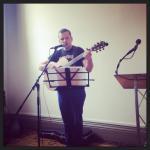
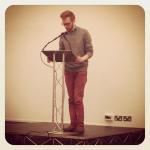
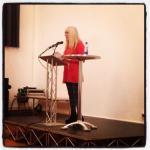
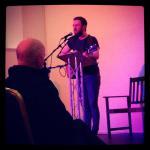
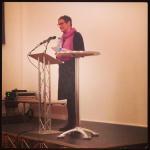
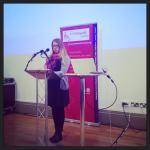
(These are some photos of my very favourite Literary Lunchtime moments)


April 22, 2016
Postcard Stories April 2016: Week Three

April 15th 2016
Grand Rapids, Michigan
Helen Crawford
“A short story is a box that we climb into to be stimulated,” says George Saunders.
The woman sitting next to you imagines a kind of elevator, smooth-walled on all four sides with a mirror for a ceiling so she can see the place where the hair is beginning to thin above her forehead. She feels claustrophobic. She doesn’t much like George Saunders. She makes a sound like a wet fish with her tongue every time he swears or mentions another anthropomorphized food item. She would leave the lecture if there weren’t four largish people between her and the aisle’s end, if she didn’t have a horror of turning heads.
“A short story is a box that we climb into to be stimulated,” says George Saunders.
You cannot help but picture the enormous cardboard box which once contained your mother’s new fridge and the three days you spent inside it once in ’88 or ’87; the way you slept there on pillows, ate your meals off picnic plates and scrawled, with crayons, on the box’s sides, then rose on the third day like Christ himself, busting through the walls to get on with business.
April 16th 2016
Grand Rapids, Michigan
Orla McAdam
We are driving through downtown Grand Rapids in a friend’s car, borrowed for the evening. Beer is in us, and pulled pork sandwiches, our fingers still sweet and sticky with the juice. You are driving backwards and forwards over the various bridges looking for a freeway exit. You are distracting yourself with your own stories. I understand. I often do this myself.
“Once I met an elderly English couple on a flight from London,” you say. “let’s call them eighty. They were travelling to Florida. They’d spent their whole lives saving up for a trip to Disneyland. It was their life’s dream.”
We spend a silent moment idling at a stoplight. It is almost impossible not to consider our own life dreams and the way they have either slipped past us or caught like netted salmon.
“Do you think they were disappointed by Disneyland?” you ask and, and I say, “no,” because everyone’s life dream is peculiar to them like the taste inside their own mouth and will seem faintly ludicrous to the next person over.
“That’s good to hear,” you say, and I notice that we are back where we started on the other side of the same bridge.
April 17th 2016
Chicago
Hannah McPhillimy
Chicago is made of glass and mirrors so you come upon yourself suddenly in shards and brief segments at every street corner. Here are your legs in a shop window, and there, your feet. Then later, your face, frowning back at you in slices. You do not recognise yourself in this city. Sometimes you are upside down and on other occasions foiled and shining as if made of some molten robotic material such as aluminium or the inside of the Terminator, melted down.
In the evening, when the sun goes down it is a large golden egg yoking itself on the skyscraper’s crown. It spills its yellowness over walls and windows, parked cars and sidewalks. Then you are transfigured and, in this moment, holy as Christ himself. You and all the people walking the streets beside you.
April 18th 2016
Chicago
Fiona Berry
It was warm in America, warmer that the girl had ever felt before. The feel of it on her skin was like hairdryers or standing too close to the radiator every time she went outside. Where the girl came from warm was only a thing you could be inside, (or possibly outside if you wore a hot water bottle zippered into the lining of your anorak). It had been this way for so long that no one ever missed the idea of hear or sunny days anymore.
The girl, thinking she was doing a good thing, left all her clothes and toiletries and holiday gifts in the hotel bin, took her empty suitcase down to the park and filled it full of hot, hot sunshine. When she went to lift her suitcase the handle was so warm she had to wrap the end of her shirt round her hand like a kind of glove. She felt bad about the holiday gifts but was sure the people at home would appreciate the warm weather more than novelty key rings or baseball caps.
Somewhere over the Atlantic all the heat leaked out of her suitcase. When the girl got home and opened it there was nothing inside but cold emptiness. The girl was disappointed. Next time she brought the weather home with her she would be sure to use Tupperware, which would be tightly sealed against leaks.
April 19th 2016
Heathrow
Zoe McGrory
The Aer Lingus help desk is serviced by a man in a cobalt blue suit with glasses. His name is Alan. We can tell this from reading his name badge. He also has a mustache and brown shoes which do not go with his suit. This man is physically incapable of saying the word sorry. It is like a brick lodges in his throat every time he thinks about saying the word sorry. He has no problem saying other similar words such as “soapy” or “lorry.” This is strange. It is only “sorry” which makes him feel as if his tongue has fallen off. This man really wishes to say the word sorry. He is so embarrassed by his own inability to apologize that he walks up and down behind the Aer Lingus help desk speaking loudly into his mobile phone which is clearly out of battery. He hopes we will think he is busy and that we will instead approach the other Aer Lingus representative, whose name is Karen. She is fully capable of saying the word sorry though sometimes she doesn’t feel like it. In his head the man is saying, “sorry, sorry, sorry,” to everyone of us passengers but no words ever come out. We glare at him like he is a bad, bad person: Donald Trump for example, or Hitler. We do not know he cannot say sorry. We think he is just being rude.
April 20th 2016
Botanic Primary, Belfast
Emily DeDakis
“Does anyone have a memory of Botanic Gardens they’d like to share?” you ask and the little boy at the front desk – the same little boy who’s answered every question so far- raises his hand and waves it wildly beneath your nose.
“Yes,” you say, “speak up now so the girls at the back can hear.”
You needn’t have bothered encouraging him. Off he goes like crosstown traffic.
“I was in the gardens one day and a man threw his cigarette in the leaves and the leaves went on fire. Whoosh! And then the trees and the grass and then everything was on fire and the whole of Botanic Gardens burnt down!”
The entire class turns instinctually to look out the window. Across the playground the gardens are still there, green as God imagined them and just beginning to bloom.
“Thank you for sharing,” you say to the boy, and truly mean it. You were planning to teach the class about historical fiction but now you don’t have to bother.
April 21st 2016
Cork
Scott Jamison
There is a man in a butcher’s uniform pushing a whole side of raw beef down Cork High Street. The meat is carefully balanced on a large waiter’s trolley. It is not even covered. I am the only one staring at this man, wondering about hygiene and propriety and the tourists who might be turned by the sight of so much blood this early on a Thursday morning.
In the market, at the fishmonger’s, I come across a picture of the Queen examining a tray of halibut and cod. Next to her is a great white shark, sheer-toothed and grinning as if about to swallow her majesty whole. No one seems to find this distasteful either. Perhaps people are not so squeamish in Cork. Perhaps they are simply too hungry to care.


April 17, 2016
Postcard Stories April 2016: Week Two
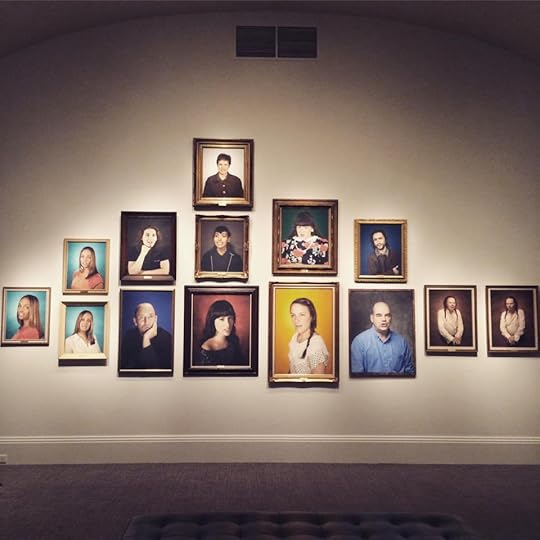
April 8th 2016
National Portrait Gallery, Washington DC
Emily O’Neill
Gallery notes for wall-mounted photography installation:-
The Japanese photographer Naoko Wowsugi arrived in Kansas City with only one word of English: “Yes,” which was at least a positive place to begin. Over the years dozens of individual friends and colleagues taught her how to speak American one tight word at a time.
Here is a photograph of eleven of these people caught in the act of speaking their special word: ‘bureaucracy,’ ‘welcome,’ ‘fabulous,’ ‘gynecologist.’ Seemingly, each of these words when spoken as an act of kindness is a form of smiling. You can see this in their eyes and in the way they are leaning forwards towards Naoko and her camera, waiting for her to reply.
April 9th 2016
Charlotte, North Carolina
Brid Gallagher
On the plane between DC and Charlotte you get talking to the elderly man in the next seat. He is from Alabama. It says so on his hat. When you say talking you are using the word in the loosest sense possible. You understand approximately one in every eight words he says: San Juan, military, cyclone. The other seven go sliding over your head like greased bullets. You fill in the gaps, give him the benefit of a good story, well-told. He reminds you of your old men, back home, chewing each word, slow and deliberate as peanut brittle.
After the plane touches down in North Carolina you say, “lovely to meet you, Sir. Safe journey back to Alabama.” You use your best elocution voice, sharpening up your Ballymena vowels. You are reasonably certain he only picks up on the word Alabama but he still smiles, takes your hand in two of his leathery hands and says something soft and buttery. You understand the sentiment completely.
April 10th 2016
Madison, Wisconsin
Jimmy Kerr
This is a story about a man who has to put his old dog down. In the story the man shoots his dog through the head with a shotgun. It is quite unlikely that the dog died in this way for America, despite what the newspapers tell us, is a reasonably civilized country. They have hospitals here, museums too, and vets who specialize in taking care of sick dogs. Rarely do Americans shoot animals which can’t be eaten.
Still, this story takes place in Wisconsin –the only place I’ve ever fired a gun- and so I choose to believe that the man killed his dog with a shotgun. Perhaps the execution even took place behind his cabin where the yard bleeds into the forest and the skeleton slips of old trees shiver in anticipation of Spring. In this story the man is a good shot and the dog is trusting and it only takes one bullet.
One hour before all this takes place, fully aware of what he will soon do, the man takes his dog through the drive-thru at McDonald’s, buys the dog a Happy Meal and a Big Mac for himself, thinks briefly of Judas Iscariot as they eat their burgers in the parking lot. Then, thinks, “don’t be so ridiculous. It’s only a dog.” This is the part which makes it a story.
April 11th 2016
Fon du Lac, Wisconsin
Paul and Jean Bleakney
You must understand that the lighthouse keeper is neither stupid nor opportunistic. He is by nature a hard working man and balks at the idea of getting something for nothing. When he first took the job on the lake the lighthouse was right by the water and the big lamp on top –turning and turning and beaming like a solar planet- the only thing keeping the boats from running a ground. Now the lake has shrunk into itself. Global warming. Soil erosion. Mismanagement of environmental resources. The lighthouse keeper isn’t even sure who or what he should be blaming for the parking lot, the trees and sandy beach which have now crept between his lighthouse and the shoreline. He is mortified every time he climbs the stairs to the top floor but he still keeps the lamp burning. He is paid to do this and he is not sort of man who will take money lightly. The lighthouse beam goes sweeping across the parking lot exposing young couples coupling in their Fords and ancient Hondas, dog walkers, seagulls and late night joggers. The light is a long arm reaching out towards the water and only just tickling its edge. The lighthouse keeper cannot bear to look at it directly.
April 12th 2016
Baraboo, Wisconsin
Margaret and Diane Lowry
Having for many years, (decades even), been the Winter home of the Ringling Brothers circus, Baraboo, Wisconsin has the highest population of retired circus performers of any small town in the United States. Here they are at eighty and even ninety still turning cartwheels down the main street, juggling the avocados in the produce aisle at the grocery store, parking their clown cars in the disabled bays and not even bothering to display their permits.
People laugh easier in Baraboo, Wisconsin. They are trained to do this, also to hang from the telephone wires, twisting and tumbling like young monkeys. When the Spring begins greening its way through the trees and scrubby bushes, they are inclined to head out in pursuit of Californian Big Tops and tight, Texan High Wires. But the circus train no longer runs through Baraboo, and they are trapped here in this ordinary place with the ordinary people and their ordinary children.
April 13th 2016
Grand Rapids, Michigan
Becca Farmer
On the wall behind the check-in desk there is a wipe-clean white board which says, “Guest of the Day,” in day-glo print, each letter a different colour. Below this someone has written, “Mitch Greenlee.” All four E’s run together like open-mouthed animals nibbling the butt of the creature in front.
You don’t ask the receptionist who Mitch Greenlee is or why he has been chosen as the motel’s favourite guest today. You just stand there with your far too large suitcase imagining what your name will look like tomorrow when it is written in luminous pink and yellow and blue.
“Does the guest of the day get some sort of prize?” you ask the receptionist and it’s not like you even care. You are only making conversation while he finds your room key. It would be enough just to know that you’d won something in a foreign country where people don’t even know that you’re moderately famous.
April 14th 2016
Grand Rapids, Michigan
Hilary Copeland
The girl in the line in front of me is asking Tobias Wolff to draw a mustache under his signature on the first page of the short story collection she has only this moment purchased from the festival bookstore. She is asking Tobias Wolff to do this because his yard brush mustache is the very first thing you notice about him, (second being the ever-so-shiny dome of his un-haired head). If this girl had ever read anything Tobias Wolff has written she would know he is also wise, articulate and dry as a mouthful of cream crackers.
I want to say, “do not be an idiot girl. You will come to regret the day you asked Tobias Wolff to sign his own book with a mustache. In the future you will colour with shame every time you see this particular book striping along your bookshelf.”
But, because Tobias Wolff is not only wise, articulate and dry-humoured, but also unbelievably kind, he is drawing a mustache on his own book. “Sorry,” he says, “it looks more like a caterpillar than a mustache.” He really shouldn’t be the one apologizing.





